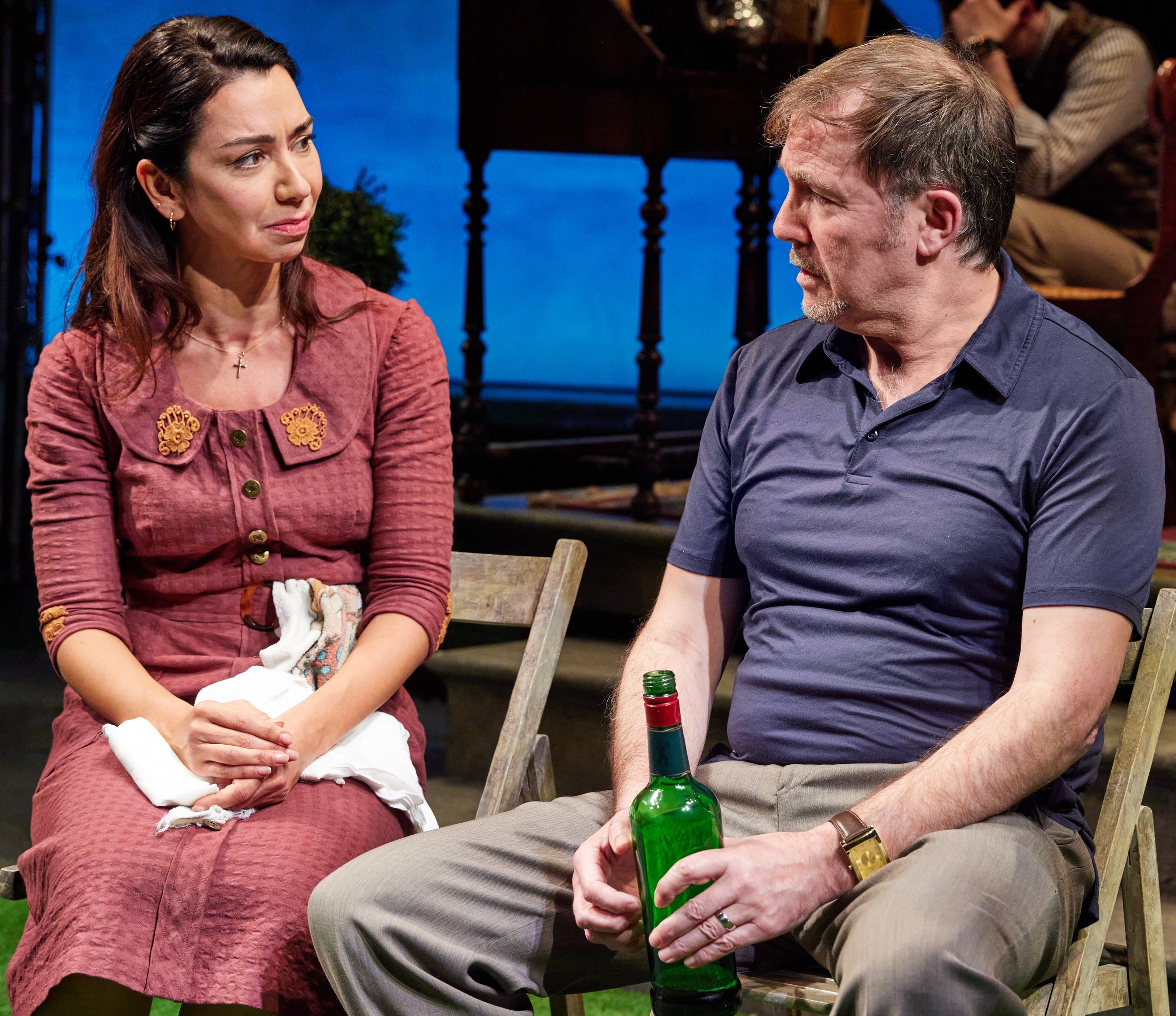Tom (Roger Dominic Casey, left), who is writing a book about the Irish Catholic aristocracy, speaks with Judge O’Donnell’s only son, Casimir (Tom Holcomb), in Brian Friel’s Aristocrats.
Brian Friel’s Aristocrats is often described as “Chekhovian,” and, indeed, the parallels to The Cherry Orchard and Three Sisters are unmistakable: three very different sisters of the O’Donnell family, along with their relations and hangers-on, navigate a collapsing estate, literally and figuratively, and grapple with a questionable family legacy and sense of purpose. Aristocrats is the second installment of the Irish Rep’s Friel Project, following an exquisite production of Translations.
Sisters Claire (Meg Hennessy, left) and Alice (Sarah Street) examine Claire’s veil for her upcoming nuptials.
Aristocrats is directed by Charlotte Moore, the artistic director of the Irish Rep, who also directed a production of the play there in 2009. The action takes place at Ballybeg Hall in the fictional village of the same name, where the family’s ailing patriarch, District Justice O’Donnell (Colin Lane, referred to as “Father” throughout), is tended to by his daughter, Judith (Danielle Ryan), whose ministrations the audience hears through a baby monitor installed in the study. The family has lorded over the village of Ballybeg for generations, and has an illustrious history, if you can believe a word that anyone says. The unreliability of the family mythology vexes Tom Huffnung (Roger Dominic Casey), a visiting professor from Chicago researching the Irish-Catholic aristocracy—the snappy title of Tom’s proposed book is Recurring Cultural, Political and Social Modes in the Upper Strata of Roman Catholic Society in Rural Ireland Since the Act of Catholic Emancipation.
Judith (Danielle Ryan, left) and Alice’s husband, Eamon (Tim Rudy), discuss old feelings. Photographs by Jeremy Daniel.
Tom is under no illusions about the title: “It’s awful. I apologize,” he says to Casimir (Tom Holcomb), Father’s only son, an emotionally stunted fantasist who may or may not have a wife and children in Germany, and about whom Father purportedly said: “Had you been born down there [the village], you’d have become the village idiot. Fortunately for you, you were born here and we can absorb you.” Casimir regales Tom with stories of Irish luminaries who visited the estate, including a “cold-eyed” W. B. Yeats, whom Casimir remembers vividly, despite Yeats’s having died before Casimir was born. In addition to Judith, restrained and dutiful and clearly in love with Willie Diver (Shane McNaughton), the estate’s handyman, the two other present daughters are Alice (Sarah Street), an unhappily married alcoholic living a drab life in London, and Claire (Meg Hennessy), the youngest, a manic-depressive about to marry a much older man. (A fourth daughter, Anna, resides at a convent in Zambia.)
Thrown into this mix of dubious personal and political histories is Eamon (an excellent Tim Ruddy), Alice’s husband, whose grandmother worked as a maid at Ballybeg Hall (“Ah, the peasantry! The professor’s talking about me, love!”). After generous helpings of Jameson’s whiskey, Eamon is fond of pointing out the truth, relying on the word absorb that father used to describe Casimir’s situation. Of Justice O’Donnell’s late wife: “She was an actress. Did you know that? No, you didn’t—that little detail was absorbed into the great silence”; of his wife’s bruised cheek, which he gave her but which no one comments upon: “It’ll be absorbed. Duty’ll conquer.”
Judith with the estate’s unofficial caretaker, Willie Diver (Shane McNaughton).
The play relies on the cauldron of tensions and secrets lurking beneath the surface, as the characters favor avoidance and silence: “a house of reticence, of things unspoken,” in Eamon’s apt words. Unfortunately, this production is marred by some fundamental staging problems that impede these subtleties and can make the play seem awkward and laborious. The set (designed by Charlie Corcoran) is a tuft of artificial turf (meant to denote former tennis and croquet courts) that opens into a well-appointed study. Sometimes the characters inside the study interact with those outside, sometimes they are cut off as though in distinct spaces, and sometimes it’s simply unclear whether they can be heard or seen; at one moment Tom is unlit while in the study but seems to be part of the scene that is going on outside. This basic confusion, and an overall inelegant use of the space and blocking, means the drama can never flow: “Why is that person sitting on the step?” is more likely to be asked than “Why doesn’t this character want to discuss her mother?”
The staging is meant to be metaphorical and not literal, of course, and yet there is little sense of decay in the estate, which is supposed to be an overwhelming theme, as we hear of rotted floorboards and crumbling ceilings. Despite some fine performances, the staging and direction of the production make the play seem aimless where it could be poignant. As Eamon says of his idea for the book Tom should write, “A bit turgid—yes—I can see that. But the romantic possibilities are there.”
Aristocrats runs through March 3 at the Irish Repertory Theatre (132 W. 22nd St.). Evening performances are at 7 p.m. Wednesday through Saturday; matinees are at 2 p.m. Wednesday and Saturday and at 3 p.m. Sunday. Tickets are available by visiting irishrep.org.
Playwright: Brian Friel
Director: Charlotte Moore
Sets: Charlie Corcoran
Costumes: David Toser
Lighting: Michael Gottlieb
Sound Design & Original Music: Ryan Rumery & M. Florian Staab






